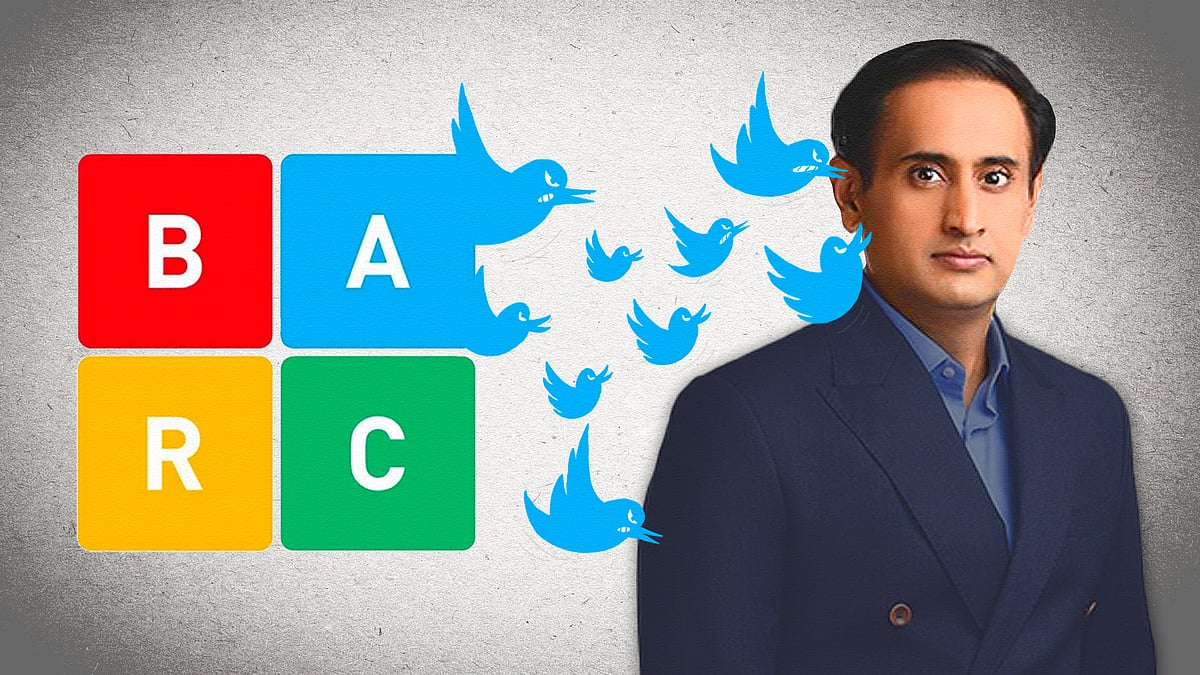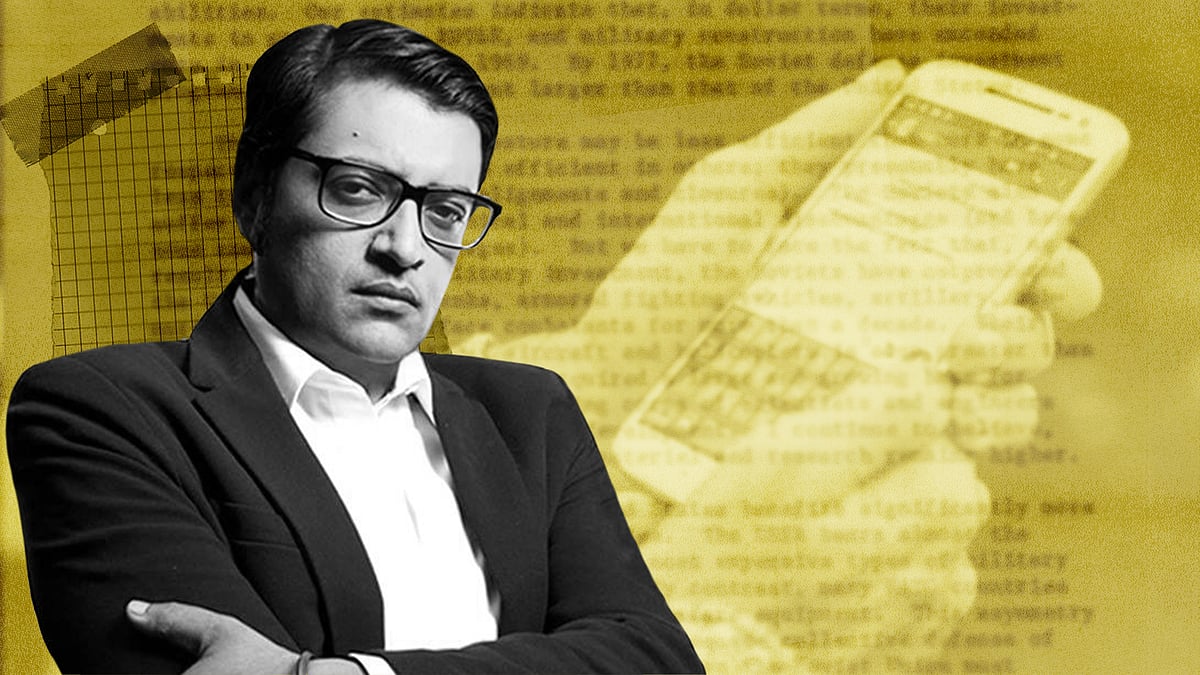Did Arnab Goswami know about the Balakot strike in advance? Probably not
Should we choose to believe an extraordinary claim when we have an ordinary explanation?
The purported WhatsApp conversations between Republic TV’s Arnab Goswami and former BARC CEO Partho Dasgupta, annexed in a supplementary chargesheet filed by the Mumbai police in the TRP scam, have enabled us to take a good look at the power games that have mushroomed under the Narendra Modi government.
They have also confirmed what many have long suspected: that behind the jingoistic clamour of Indian TV news rests a network of opportunistic brokers and middlemen whose sole ambition is to line their pockets and hanker after power.
However, the revelations have also produced speculations that are half-baked. The most popular one so far is that Goswami’s chats establish that the anchor had prior knowledge of the Balakot air strike of February 2019, and possibly, the revocation of Article 370 six months later. In other words, he was privy to a top secret military operation and a political decision with grave security implications.
This claim has been made not only by political parties and Times Now, Goswami’s former employer, but also by journalists at independent media organisations.
The speculation began on Twitter, but soon appeared on news websites with clickbait headlines. Scroll went with, “Three days before Balakot strike, Arnab Goswami said ‘something big will happen’ on WhatsApp chat”. The Wire took it a step further, reporting that Goswami seemed ”aware of the Balakot air strike and the revocation of Article 370 in advance, highlighting his close connections with the upper echelons of government”.
The Quint argued that the Republic TV editor’s messages appear “to indicate not only that Goswami had some advance knowledge that the government was going to retaliate in a big way to the Pulwama attack, days before the Balakot air strike”, and that he “appears to have had some advance knowledge of the abrogation of Article 370”.
Mohammad Zubair of AltNews and Aditya Menon of the Quint made similar imputations on Twitter.
There are four main problems with this extraordinary claim – it is vague and not supported by adequate evidence; it’s out of context; it does not explain why the anchor would pass on a military secret to an executive at a ratings agency; and, lastly, it misses the dynamics between Goswami and Dasgupta revealed by the chats themselves.
The supposedly incriminating message went out at 10.31 pm on February 23, 2019. “On another note something big will happen,” Goswami told Dasgupta. Three days before the Balakot airstrike.
Asked to explain, he said it would be “bigger than a normal strike”, adding: “And also on the same time something major on Kashmir. On Pakistan the government is confident of striking in a way that people will be elated. Exact words used.”

A day before he sent these messages, Goswami had interviewed Rajnath Singh, then the home minister, on Republic Bharat. Singh told the anchor live on air that the government was not ruling out a military option in response to the Pulwama attack. He didn’t even deny the prospect, suggested by Goswami, that a military strike might be carried out inside Pakistan.
When Singh said it was time to fight a “decisive battle” against terrorism, Goswami asked, “Wasn't the surgical strike a decisive fight? A decisive battle?”
“We do not entirely consider surgical strike a decisive battle. I said a decisive battle should be fought against terrorism,” Singh replied.
But a decisive battle, Goswami persisted, should be fought against Pakistan, and “it should be fought inside Pakistan”.
“It is possible that even Pakistan might be forced [to fight terrorism]. We cannot rule it out,” Singh replied. “If it doesn't happen, then there will be consequences.”
A journalist covering defence for a national daily told Newslaundry it was common knowledge among journalists on the beat that an air strike was one of the options the government was mulling over at the time.
“We all wrote that something was going to happen. The government hinted at it too,” the reporter said, referring to Modi’s promise a day after the Pulwama blast that those behind it would “pay a very heavy price for their actions”.
That the Indian government could resort to a military option, including an air strike, wasn’t an unusual opinion. On February 16, for one, the Times of India reported that “carefully calibrated airborne strikes” were the favoured option within the security establishment.
For a journalist as embedded in the high offices as Goswami, it would be merely another day at work if the broad contours of a military strike were given to him, without the sensitive details.
The defence reporter, however, pointed out that the timing of Goswami’s message to Dasgupta was critical. “The fact that he told him this three days before the event is quite problematic,” he said.
But there are also messages after the air strike. On February 27, Dasgupta asked Goswami: “Was yesterday’s airstrike the ‘big one’ you spoke about? Or something more?”
“More to come,” Goswami replied.
Only the anchor would know what this meant. But if he did have military secrets, this “more to come” did not materialise. A week later, however, the Press Trust of India reported that remarks made by Modi at an event on March 4 indicated that the air strike “won't be India's last such action against terrorism emanating from the neighbouring country”.

Goswami’s “more than a normal strike”, in effect, is quite vague to show that he had specific details of the Balakot air strike. It is a logical leap that must be backed with evidence, but isn’t.
Another journalist covering national security disagreed. He said he was “70 percent sure” that Goswami had been privy to sensitive military matters but did not rule out the possibility that the anchor could have been bragging about his access to powerful politicians.
“The precedence before the Balakot strike was the surgical strike, which was conducted in Pakistan occupied Kashmir, a disputed territory,” the journalist pointed out. “The Balakot strike happened in Pakistan proper. And the fact that Arnab mentioned this would be more than a normal strike, that is the significant portion. That is a huge jump and it has to be told by someone. He might not have had the exact details, but clearly he was aware of a strategic decision to go beyond the Line of Control, beyond PoK. That is the real meat.”
Nitin Gokhale, a former security editor at NDTV and founder of BharatShakti.in, differed. “Did he say the strike was going to be in Balakot or that it will be at such and such time, or that this number of airplanes would cross the LOC?” he asked. “If you show me that, then I’ll say yes, he had military secrets.”
Gokhale told Newslaundry it was impossible that the Modi government could have passed military secrets to Goswami.
“That kind of planning is known only to the people who plan and execute the operation,” he argued. “They will not go to the prime minister’s office or the defence minister. It is guarded very closely by five or 10 people, not more than that.”
The media’s coverage of the Arnab-Partho chats, Gokhale said, has made “a mountain out of a molehill”. “Anybody with some kind of knowledge about such issues would have guessed it without anyone telling them,” he added. “If you’ve done Uri as a land raid across the Line of Control, then what’s a bigger thing to do if you have more casualties than Uri? An experienced reporter or analyst would have surmised this.”
Goswami’s chats with Dasgupta are garnished with references to his meetings in the prime minister’s office and with a mysterious “AS”. They must be seen through the prism of his relationship with Dasgupta. Even while the anchor told Dasgupta about the strike, he was regularly gloating about how well the Republic network covered an event – always better than any lowly competitor. Goswami even gave details of when he broke a story and the exact number of minutes it took for Aaj Tak to pick it up.
It is amply clear that Goswami was overmarketing his network to the then BARC chief, who held the key to his channel’s ratings, and flexing his access. This leads us to the possibility that most of his claims were either overstated or simply untrue.
Goswami’s most egregious bragging happened in August 2019. He told Dasgupta that on the day the Indian government revoked Article 370 in Kashmir, he had not only met the national security advisor, Ajit Doval, and PMO officials, but even got a call from Doval separately.
“Everyone in NSA PMO everyone hooked to Bharat and Republic,” he told Dasgupta.
Two days later, on August 7, he claimed that Republic was facing a “huge war”, a “massive cyber war” from Pakistan.
Dasgupta’s replies to these messages were rather muted: either a “hmm”, “hmm not surprised”, or a bunch of emojis.

On January 17, weighing in on whether Goswami had sensitive information or had been simply boasting, AltNews founder Pratik Sinha argued that he saw “no reason to assume either way”, adding: “But does that automatically mean that he wasn't tipped off and didn't have information beyond what a person not involved in the affairs should?”
Sinha may be posing the question the wrong way. Instead, one should consider this: Goswami told a ratings agency executive that “something big” was going to happen, “bigger than a normal strike”. Does that automatically mean that he was tipped off about a military secret?
There is also no equivalence between the twin possibilities at hand. Goswami having secret information about the Balakot air strike is an extraordinary claim, carrying weightier connotations than a more ordinary explanation that he was just exaggerating what he knew, and what many knew. Since there is little to prove the former, it is the latter that explains his chats better.
This is the fourth report in a series on the Whatsapp chats that purportedly show former BARC chief Partho Dasgupta's collusion with Republic TV head Arnab Goswami to manipulate TRPs, political lobbying and influence peddling, and more. Read the other reports in this series.
 BARC ex-chief wanted to hire a troll army to go after journalists
BARC ex-chief wanted to hire a troll army to go after journalists ‘One must play dirty’: Chats show how Arnab Goswami plotted with BARC CEO
‘One must play dirty’: Chats show how Arnab Goswami plotted with BARC CEO